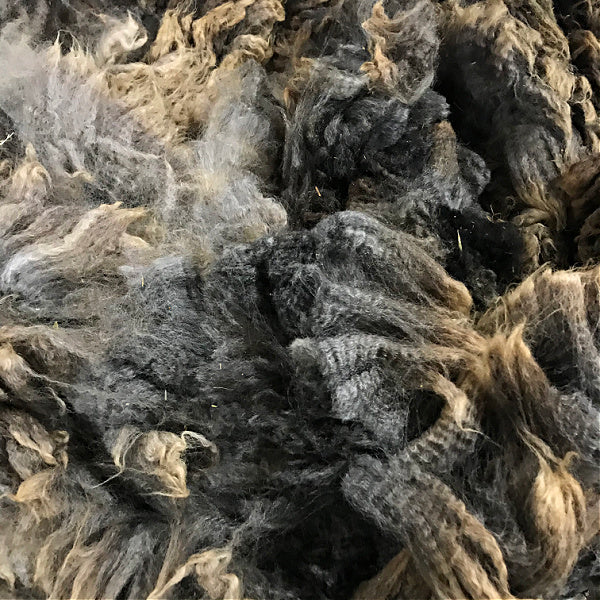Photos, unless otherwise noted, courtesy of Battenkill Fibers
A deep and abiding interest in the natural world has defined Mary Jeanne Packer’s life and career.
Packer founded Battenkill Fibers in 2009 “to provide value-added, custom carding and spinning services for fiber farms and makers; and to manufacture yarn and fiber products for wholesale and retail markets. The mill produces 100-150 lbs of artisan quality natural-colored and dyed semi-worsted yarn daily using refurbished traditional milling machinery. Since its founding, Battenkill Fibers has grown to provide 15 full-time and part-time jobs and was recognized as Washington County Small Business of the Year in 2015.”
In addition, Packer, a resident of Greenwich (pronounced “Green Witch”, not “Grin Itch”), New York, is one of the founders and president of the Southern Adirondack Fiber Producers Cooperative, founder and board member of the Hudson Valley Textile Project, secretary of the Empire Sheep Producers Association, and an Empire Alpaca Association member. In addition, she has also owned or co-owned several yarn stores in past years, as well as organized annual guided international and domestic textile tours. With her B.S. in engineering from the Massachusetts Institute of Technology (MIT) and a masters in communications management from Syracuse University, Packer has also served on the boards of the Cornell Cooperative Extension Washington County, NY Farm Viability Institute, NY Ag in the Classroom, Forest Landowners Association, and Empire Council of Ag Organizations.

Mary Jeanne Packer
In the past year, as many of us have spent the vast majority of our time at home, or within walking distance of it, it seems our collective understanding and appreciation of the natural world, and its transitions from season to season have accelerated. Our desire to support businesses rooted in our local community has also increased.
As we transition from the darkness and stasis of winter to the spring, as young grass sprouts beneath our feet, as the songs of birds return to our neighborhoods, as increased warmth and light enter again, we naturally shed some of the literal and metaphorical layers we have accumulated during the winter, newly appreciative of the ways the earth supports our life in every way.
But for fiber entrepreneur Packer, among others, the symbiotic relationship between humans and the natural world, the individual and the larger community of people surrounding the one, has been obvious for decades.


Please read on for insight into the mind and journey of a fascinating woman whose life choices and goals seem to reflect and answer a call many of us have discovered in ourselves recently.
NEW YORK MAKERS: When did you first become seriously interested in the natural world?
MARY JEANNE PACKER: Well, my father was a school superintendent, so we grew up all over the Eastern United States. As a mother of five, I can say with certainty that the adult a person becomes can be seen by the time a child is five or six. How they speak to people, see the world, interact with it, is in many ways set. I always loved the outdoors, and, when I was five, I taught myself to knit with a little picture book. I always loved fabric and textiles, and nature and animals. But it wasn’t until I was in high school in Western New York that I not only truly connected those things, but also realized they could become a career. I ended up going to MIT to study natural resources management, civil engineering. I wanted to connect people and nature through parks, to learn how to build bridges and shelters.
NYM: You went to MIT in the 1970s. What was that like? Were there a lot of other women there?
MJP: MIT was always a relatively diverse community, but I was one of the few women. On my first week there at an assembly, the dean welcomed me as the recipient of the Betty Crocker Future Homemakers Scholarship. Everyone turned and looked at me. It was quite a moment.
NYM: No. You’re joking, right? Was it actually called that?
MJP: Oh yes. It’s hard to believe now. But I had a wonderful experience at MIT. I had a phenomenal advisor, who was actually approached by the New England Telephone company, now part of Verizon, for their best guy, because they wanted to recruit and hire him to build microwave antennas across New England. Well, he very cleverly said, your best guy is MJ Packer. I showed up for the interview, and the recruiter told me I had the wrong room. But I told him, “No, I don’t. I’m MJ.”
NYM: Did he hire you?
MJP: He sure did! I had a wonderful experience at the phone company too, working all over New England. But then I transitioned into forest work and consulting. I had five children, and, along the way, my passion for knitting and fiber just increased. I began to understand the importance of locally produced yarn and fiber products, not just for the quality, but for the local economy. I bought and co-owned several yarn stores in the Finger Lakes and Vermont and helped found the farmer-owned Southern Adirondacks Fiber Producers Cooperative and the Hudson Valley Textile Project. I also worked with the Empire Sheep Producers Association and the Empire Alpaca Association.
NYM: How did you decide to transition from consulting to yarn full time?
MJP: My youngest of five flew the nest. I realized that the gap between the sheep and farmers, and the market of knitters, was only growing wider. Leaders in Washington County were becoming increasingly engaged with the problem themselves, because they realized, if the rural environment we all love so much is going to continue to flourish, we had to find a way to connect the dots. It’s funny, with such a smaller community of farmers and yarn stores, you’d think there’d be competition, but we all work together. We see our biggest competitors as being overseas.

NYM: So tell us about where you sit in the supply chain. You are neither a farmer nor a store.
MJP: True. I take the wool and make the yarn. I work with about 1,000 farmers a year. We hand sort and wash, removing vegetation and dirt. We air dry it, then we process the yarn for the farmers themselves or wholesale. We also have a small mill shop, where people can visit and buy yarn during normal non-COVID times.


NYM: How did you find the space to build out a mill? And did you bootstrap it financially?
MJP: Washington County, bless their hearts, was so serious about spurring economic development among value-added businesses in the agricultural sector, they gave me a low-interest loan that covered about 75% of my start-up costs in 2009. But soon after I built out the mill, with hundreds of thousands of dollars worth of equipment, an electrical fire gutted the space and destroyed my equipment in the process. I didn’t know what to do. I really questioned my decision to start in the first place. But thanks to angel investors, and people who just told me I had to follow my dream, and also the kind people in charge in Washington County who allowed me to keep the loan without collateral, I decided to try again. I’d found a space down the street in Greenwich, but then the woman who rented the space to me died a few days later. Thankfully, her family knew me and my story — her daughter owned a yarn store in Saratoga, and we’d known each other for years — and they felt that if their mother had signed off on an agreement that it was the right thing to move forward. It was like two tragedies came together and somehow the decision to move forward was healing for all of us.


Photos: New York Makers
NYM: That’s wild. What was it like building two mills from the ground up? You’re a civil engineer, but was there a learning curve?
MJP: Oh a huge, very steep learning curve. I would not have been able to do it without the support and intelligence of this vast agricultural community. This experience has only underlined to me the power of local agriculture, and the importance of preserving it and the crafts and knowledge that come along with it. I have worked with incredible electricians, tractor people, mechanics, and farmers who know how to move, adjust, install, and fix incredibly intricate equipment. I could only have done this here. And it’s so neat to see how I can turn sheep’s wool into yarn that these farmers can go and sell it and support themselves, inspire others to make beautiful things and appreciate the natural world in a new way. We have one farmer we work with, On a Wing and a Prayer, and she has more than 30,000 followers on Instagram. She’s selling not just yarn, but a beautiful lifestyle that people want to understand and learn about. I feel incredibly lucky to be a part of this community. We’re connected to the land, to nature, to each other.
We are. And with companies like Battenkill Fibers, we all feel just a little bit closer to the world’s beauty.

A beautiful moment at Foster Sheep Farm in Schuylerville, NY


Leave a comment